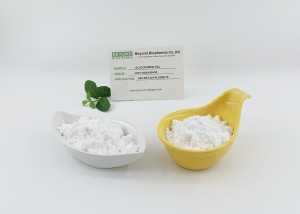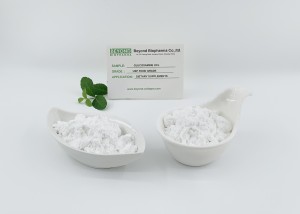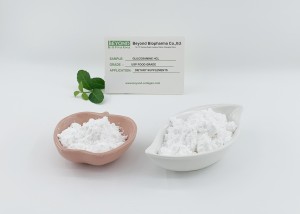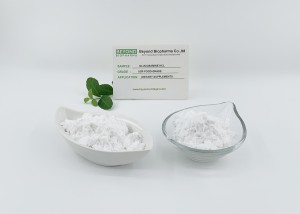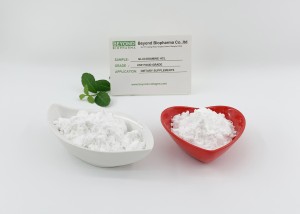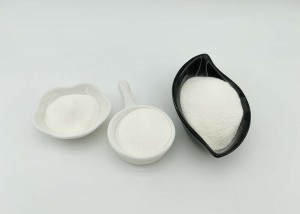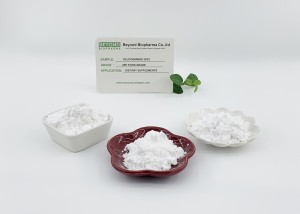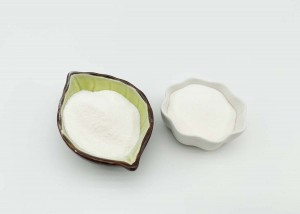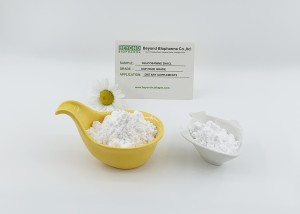Premium Food Grade Glucosamine HCL Used for Nutrition Supplements
Glucosamine hydrochloride is extracted from natural crustacean, which is a Marine biological agent that can promote the synthesis of mucopolysaccharide, improve the viscosity of joint slip fluid, improve the metabolism of articular cartilage, and promote the efficacy of antibiotic injection. The supplement of glucosamine medium can enhance the N-glycosylation of secretory proteins, and affect the cell line variation such as ring cells and stem cells.
| Material name | Glucosamine HCL |
| Origin of material | Shells of shrimp or crab |
| Color and Apperance | White to slight yellow powder |
| Quality Standard | USP40 |
| Purity of the material | >98% |
| Moisture content | ≤1% (105°for 4 hours) |
| Bulk density | >0.7g/ml as bulk density |
| Solubility | Perfect solubility into water |
| Application | Joint care supplements |
| Shelf Life | 2 years from production date |
| Packing | Inner packing: Sealed PE bags |
| Outer packing: 25kg/Fiber drum, 27drums/pallet |
| Test Items | CONTROL LEVELS | TESTING METHOD |
| Description | White Crystalline Powder | White Crystalline Powder |
| Identification | A. INFRARED ABSORPTION | USP<197K> |
| B. IDENTIFICATION TESTS—GENERAL, Chloride: Meets the requirements | USP <191> | |
| C. The retention time of the glucosamine peak of the Sample solution corresponds to that of the Standard solution, as obtained in the assay | HPLC | |
| Specific Rotation (25℃) | +70.00°- +73.00° | USP<781S> |
| Residue on Ignition | ≤0.1% | USP<281> |
| Organic volatile impurities | Meet requirement | USP |
| Loss on Drying | ≤1.0% | USP<731> |
| PH (2%,25℃) | 3.0-5.0 | USP<791> |
| Chloride | 16.2-16.7% | USP |
| Sulfate | <0.24% | USP<221> |
| Lead | ≤3ppm | ICP-MS |
| Arsenic | ≤3ppm | ICP-MS |
| Cadmium | ≤1ppm | ICP-MS |
| Mercury | ≤0.1ppm | ICP-MS |
| Bulk density | 0.45-1.15g/ml | 0.75g/ml |
| Tapped density | 0.55-1.25g/ml | 1.01g/ml |
| Assay | 98.00~102.00% | HPLC |
| Total plate count | MAX 1000cfu/g | USP2021 |
| Yeast&mold | MAX 100cfu/g | USP2021 |
| Salmonella | negative | USP2022 |
| E.Coli | negative | USP2022 |
| Staphylococcus Aureus | negative | USP2022 |
The complete and detailed production process is scientific and rigorous, but here you can briefly introduce the general process:
1.Start with glucosamine, which can be derived from shellfish shells or produced by corn fermentation.
2.React the glucosamine with sulfuric acid to form glucosamine sulfate.
3.Combine the glucosamine sulfate with sodium chloride (table salt) to form glucosamine sulfate sodium chloride.
4.Purify and crystallize the compound to obtain the final product.
Glucosamine sulfate sodium chloride is commonly used as a dietary supplement to support joint health. Some specific features of glucosamine sulfate sodium chloride include:
1.Joint Support: Glucosamine sulfate helps support the structure and function of joints by promoting the production of cartilage, which cushions and protects the joints.
2.Anti-Inflammatory Properties: Glucosamine sulfate has been shown to have anti-inflammatory effects, which can help reduce joint pain and stiffness.
3.Bioavailability: Glucosamine sulfate sodium chloride is known for its high bioavailability, meaning it is easily absorbed by the body and can be effectively utilized.
4.Safety: Glucosamine sulfate sodium chloride is generally considered safe for most individuals when taken as directed, with few reported side effects.
Glucosamine sulfate sodium chloride is important for our joints because it plays a key role in maintaining the health and integrity of cartilage, which is the connective tissue that cushions our joints. Here are some specific reasons why it is crucial for joint health:
1.Cartilage Support: Glucosamine sulfate is a building block for the synthesis of proteoglycans and glycosaminoglycans, which are essential components of cartilage. By promoting the production of these substances, glucosamine helps maintain the structure and function of cartilage.
2.Joint Lubrication: Glucosamine sulfate can also stimulate the production of synovial fluid, which lubricates the joints and helps reduce friction between the bones during movement.
3.Anti-Inflammatory Effects: Glucosamine sulfate has anti-inflammatory properties, which can help reduce joint inflammation and pain associated with conditions like osteoarthritis.
4.Repair and Regeneration: Glucosamine sulfate may support the repair and regeneration of damaged cartilage, potentially slowing down the progression of joint degeneration.
While glucosamine sulfate sodium chloride is primarily known for its benefits to joint health, some research suggests that it may also have positive effects on skin health. Here are some ways in which glucosamine sulfate sodium chloride could potentially benefit the skin:
1.Collagen Production: Glucosamine sulfate is a precursor to glycosaminoglycans, which are essential components of collagen, the protein that gives skin its structure and elasticity. By supporting collagen production, glucosamine sulfate may help improve skin firmness and reduce the appearance of wrinkles.
2.Moisture Retention: Glucosamine sulfate has hydrating properties that can help the skin retain moisture, leading to improved skin hydration and a more youthful appearance.
3.Anti-Inflammatory Effects: Glucosamine sulfate has been shown to have anti-inflammatory properties, which may help reduce redness, irritation, and inflammation in the skin.
4.Wound Healing: Some studies suggest that glucosamine sulfate may promote wound healing by stimulating the production of hyaluronic acid, a key component of the skin's natural repair process.
While more research is needed to fully understand the effects of glucosamine sulfate sodium chloride on skin health, incorporating it into your diet or skincare routine may potentially offer benefits for your skin in addition to its well-known benefits for joint health.
1. Shellfish or Fermentation: We supply glucosamine hydrochloride with the right origin you want, no matter the shellfish origin or the fermentation plant origin, we have both available for your choice.
2. GMP Production facility: The glucosamine hydrochloride we supplied was produced in the well-established GMP production facility.
3. Strict quality control: All the glucosamine hydrochloride we supplied was tested in QC laboratory before we released the material for you.
4. Competitive price: We have our own factory, so our price of glucosamine hydrochloride is competitive and we can promise what we provide your glucosamine with high quality.
5. Responsive Sales Team: We have dedicated sales team providing fast response to your inquiries.
1. Free amount of samples: we can provide up to 200 gram free samples for testing purpose. If you want a large number of samples for machine trial or trial production purposes, please kindly buy 1kg or several kilograms you need.
2. Ways of delivery the sample: We usually use DHL to deliver the sample for you. But if you have any other express account, we can also through your account send your samples.
3. Freight cost: If you also had a DHL account, we can send via your DHL account. If you do not have, we can negotiate how to pay for the freight cost.

